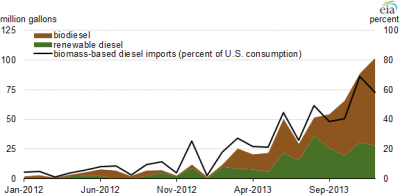 Mounthly U.S. biodiesel and renewable diesel imports, 2012-2013. (Source:
Mounthly U.S. biodiesel and renewable diesel imports, 2012-2013. (Source: U.S. Energy Information Administration)
The United States imports two varieties of biomass-based diesel fuel—biodiesel and renewable diesel. Last year, total U.S. imports of these two varieties of biomass-based diesel fuel reached 525 million gallons, compared to 61 million gallons in 2012.
Two principal factors drove the increase in U.S. biodiesel imports: growth in domestic biodiesel demand to satisfy renewable fuels targets, and increased access to biodiesel from other countries. As a result, the United States switched from being a net exporter of biomass-based diesel in 2012 to a net importer in 2013 by a wide margin.
Growth in U.S. biomass-based diesel demand. The strongest driver of the resurgence in U.S. biomass-based diesel demand was the increasing Renewable Fuel Standard (RFS) target. Both biodiesel and renewable diesel qualify for the biomass-based diesel and advanced biofuel targets, as well as the overall RFS target. The total RFS target increased from 15.20 billion gallons in 2012 to 16.55 billion gallons in 2013. The biomass-based diesel and advanced biofuels targets increased from 1.00 billion gallons to 1.28 billion gallons, and from 2.00 billion gallons to 2.75 billion gallons, respectively. Biomass-based diesel fuels have higher energy content compared with ethanol, and thus generate more Renewable Identification Number (RIN) credits per gallon of fuel produced. In addition, renewable diesel meets the same American Society for Testing and Materials (ASTM) standards as petroleum diesel, and is thus not subject to the blending limits imposed on biodiesel.
Biomass-based diesel fuels also qualify for the California Low Carbon Fuel Standard (LCFS).
Increased domestic biodiesel production only partially offset the effect that increased U.S. biodiesel consumption had on driving up imports. U.S. biodiesel production reached 1.34 billion gallons in 2013, a 35% increase over 2012, including a record 135 million gallons in December. Given the elimination of the tax credit, soybean feedstock constraints, and limited renewable biodiesel production capacity, U.S. imports of biomass-based diesel fuels are likely to continue to play an important role in meeting the LCFS and the RFS targets going forward.
Increased access to biodiesel from other countries. Last year’s increase in imports of regular biodiesel were primarily from Argentina, particularly in the final four months (September to December). This likely resulted from a recent European Union antidumping duty imposed on biodiesel from Argentine producers in late 2013. The European Union was previously the destination for most of Argentina’s biodiesel exports. The remaining volumes of regular biodiesel imports entered the United States on the East Coast (PADD 1) and Gulf Coast (PADD 3) from Indonesia and various European countries. U.S. renewable diesel imports reached 210 million gallons in 2013, eight times more than in 2012. Just over 77% of total U.S. renewable diesel imports came from Singapore and entered the United States on the West Coast (PADD 5), likely for California LCFS compliance.

